Welcome to the Wednesday, April 26, Brew.
Here’s what’s in store for you as you start your day:
- Iowans to vote on gubernatorial succession amendment in 2024
- Voters in Lincoln, Neb., to select a mayor in May 2 general election
- Democratic Party committees lead Republican Party committees in fundraising for the 2024 election cycle
Iowans to vote on gubernatorial succession amendment in 2024
As is true in 44 other states, Iowa’s lieutenant governor is first in line to replace the governor in the event of a vacancy. But who fills the vacant lieutenant governor office?
That’s a question Iowa voters will decide in 2024 when the Iowa Gubernatorial Succession Amendment appears on the ballot. Currently, if Iowa’s governor leaves office, the lieutenant governor assumes the duties and powers of the governor but does not have the authority to appoint a new lieutenant governor. If voters approve the measure, the new governor—the former lieutenant governor—would have the power to appoint a new lieutenant governor.
The succession issues came into sharp focus in 2017, when then-Gov. Terry Branstad (R) resigned to become President Donald Trump’s (R) ambassador to China. Kim Reynolds, who had been elected lieutenant governor in 2010, became governor, and Reynolds selected Adam Gregg (R) as her replacement.
However, before Reynolds was sworn in, Iowa Attorney General Tom Miller (D) issued a legal opinion stating Reynolds lacked the authority to appoint her own lieutenant governor. In the end, Gregg served as lieutenant governor and drew the normal salary but remained outside the line of succession until he was elected to a full term in 2018. If the governor’s office had become vacant before Gregg won election, the president of the Iowa Senate would have become governor.
We looked at the gubernatorial line of succession in all 50 states in the March 31 Brew.
Here’s who comes first in the gubernatorial line of succession across the country:
- In the 45 states with a lieutenant governor, that individual is the first in the line of succession. That includes West Virginia and Tennessee, where the state Senate presidents serve as lieutenant governor ex officio.
- In Maine and New Hampshire, the president of the state senate is first in line to succeed the governor.
- In Arizona, Oregon, and Wyoming, the secretary of state is first in line to succeed the governor.
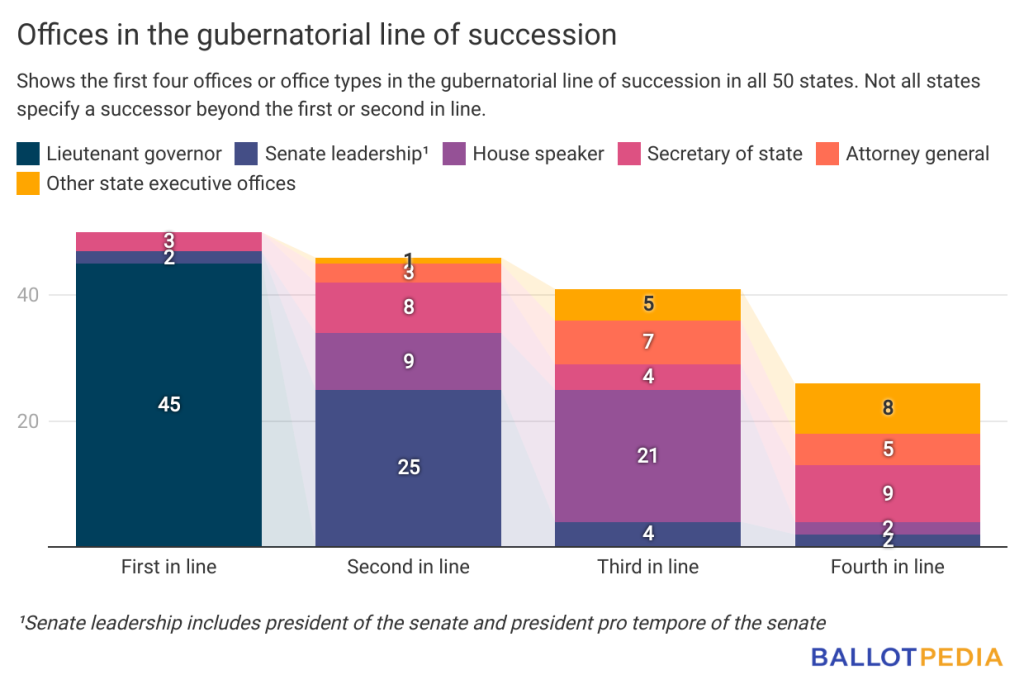
Voters in Indiana will also decide a constitutional amendment related to the gubernatorial line of succession in 2024. Under the proposal, the superintendent of public instruction would be removed from the line of succession since the position was abolished in 2021 and replaced by the secretary of education, a position the governor appoints.
The Iowa Legislature referred the amendment to the ballot on April 19, when the Iowa Senate voted 50-0 to approve House Joint Resolution 3 (HJR 3). The Iowa House approved HJR 3 81-81 on Feb. 1. In Iowa and 12 other states, legislatively referred constitutional amendments go before voters if they pass both chambers of the legislature in two consecutive legislative sessions. The amendment passed the House and Senate in February and March of 2022, respectively.
Voters in Lincoln, Neb., to select a mayor in May 2 general election
We’re covering 40 mayoral races this year, and the next general election on our calendar is May 2, in Lincoln, Neb. (we’re also covering mayoral primaries in Fort Wayne, Ind., and Indianapolis, Ind., as well as Columbus, Ohio, on the same day).
Let’s take a look at Lincoln—Nebraska’s state capitol. With a population of around 293,000, it’s the fifth largest state capitol holding mayoral elections this year.
Incumbent Leirion Gaylor Baird and Suzanne Geist are running in the nonpartisan election. They were the top-two vote-getters in the April 4 primary.
While mayoral elections in Lincoln are officially nonpartisan, candidates for office are often affiliated with one of the two major political parties. Gaylor Baird is affiliated with the Democratic Party, and Geist is affiliated with the Republican Party. The last Republican mayor of Lincoln, Mike Johanns, left office in 1998.
Gaylor Baird was first elected mayor in 2019. A former member of Lincoln's City Council, Gaylor Baird has focused on public safety, economic development, and infrastructure.
Geist, a business owner, represented District 25 in the Nebraska Senate from 2017 until April 6, 2023, when she resigned. Geist said she would support law enforcement, promote economic growth, and invest in local infrastructure.
Gaylor Baird has criticized Geist for her voting record while serving in the state senate, including on abortion, transgender issues, and concealed firearms. Baird said: “Her voting record at the state Capitol makes it clear that her priorities are not our shared priorities. … They hurt Lincoln and they hurt Nebraska.”
Geist has criticized Gaylor Baird’s record on public safety. Geist tweeted, “It’s important to understand that law enforcement supports me, not @MayorLeirion for a reason. I’ve stood shoulder to shoulder with law enforcement in the legislature because it was the right thing to do. Leirion stood by when there were riots in ‘20 instead of with the police.”
The Lincoln Fire Fighters Association, EMILY's List and the Sierra Club endorsed Gaylor Baird. The Lincoln Police Union, Gov. Jim Pillen (R), and U.S. Sens. Pete Ricketts (R) and Deb Fischer (R) endorsed Geist.
Lancaster County, where Lincoln is located, voted for President Joe Biden (D) 52.7% to Trump’s 44.9% in 2020.
As of April 2023, the partisan breakdown of the mayors of the 100 largest U.S. cities was 62 Democrats, 26 Republicans, three independents, and seven nonpartisans. Two mayors' partisan affiliations were unknown. Based on 2020 population estimates, 76.1% of the population of the top 100 cities lived in cities with Democratic mayors, and 16.2% lived in cities with Republican mayors at the start of 2022.
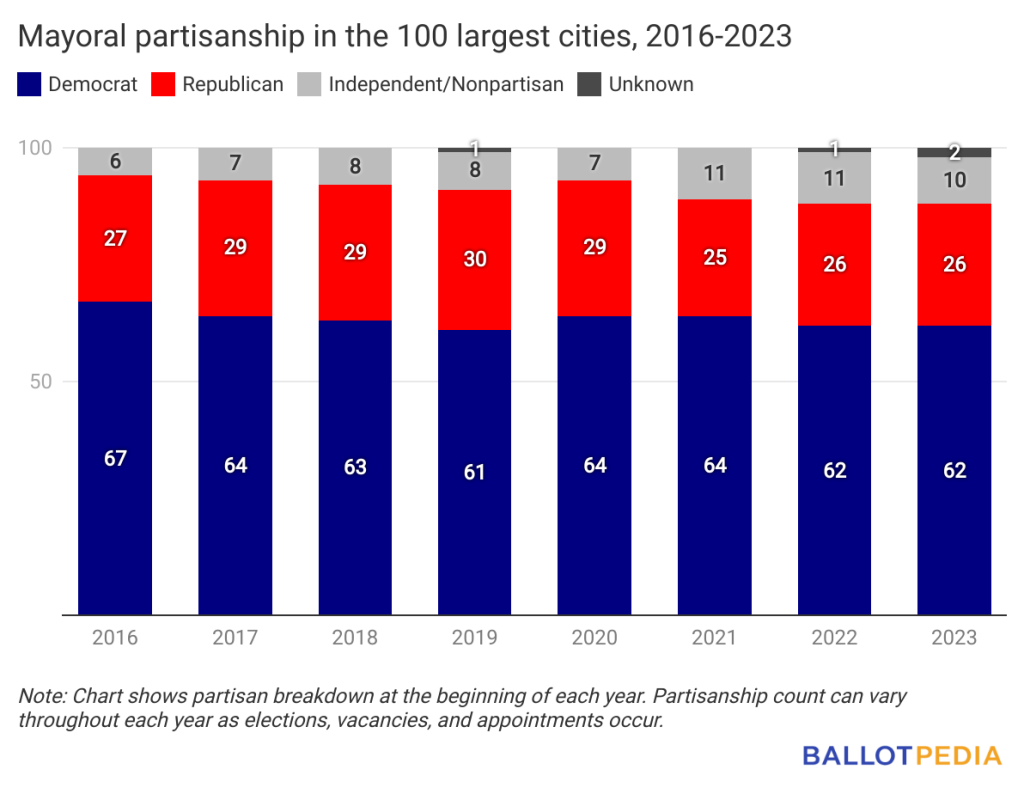
Lincoln is also holding elections for seats in the city council and the Lincoln Airport Authority on May 2, 2023.
Democratic Party committees lead Republican Party committees in fundraising for the 2024 election cycle
The three committees associated with the Democratic Party have raised a cumulative $81 million for the 2024 election cycle, while those associated with the Republican Party have raised $66 million. Those figures are through March 31, 2023, the most recent required reporting deadline.
The three Democratic committees are the Democratic National Committee (DNC), the Democratic Senatorial Campaign Committee (DSCC), and the Democratic Congressional Campaign Committee (DCCC). The three Republican committees are the Republican National Committee (RNC), National Republican Senatorial Committee (NRSC), and National Republican Congressional Committee (NRCC).
So far in the 2024 election cycle, the DNC, DSCC, and DCCC each lead their Republican counterparts in cumulative receipts and disbursements. See the table below for exact figures.
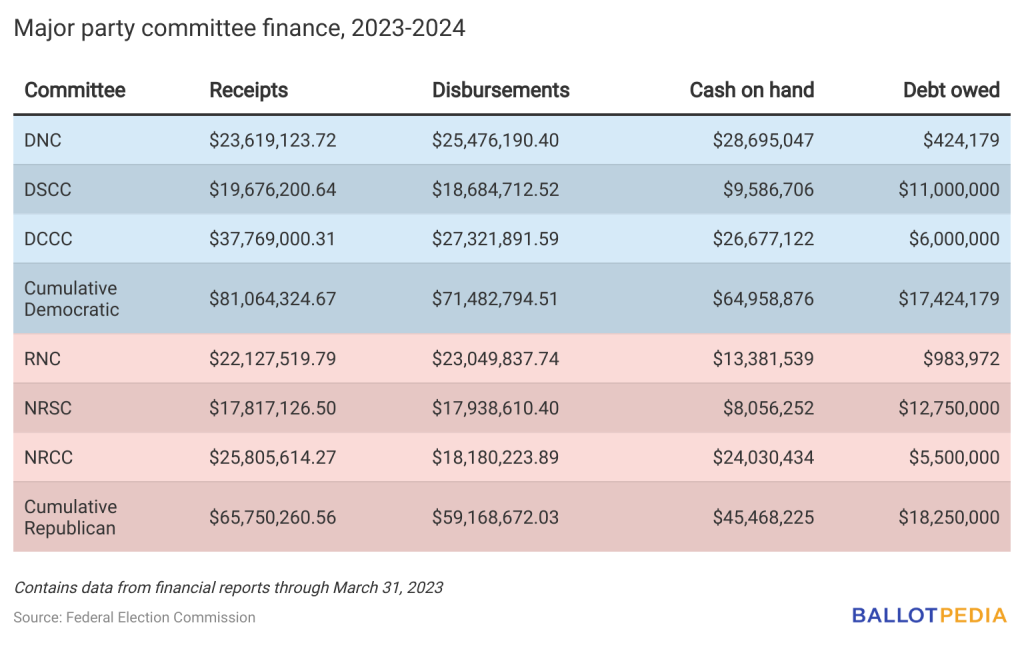
The Democratic committees’ cumulative receipts this past March ($81 million) outpace their receipts at this point in the 2020 election cycle ($67 million), but are lower than their receipts at this point in the 2022 election cycle ($105 million).
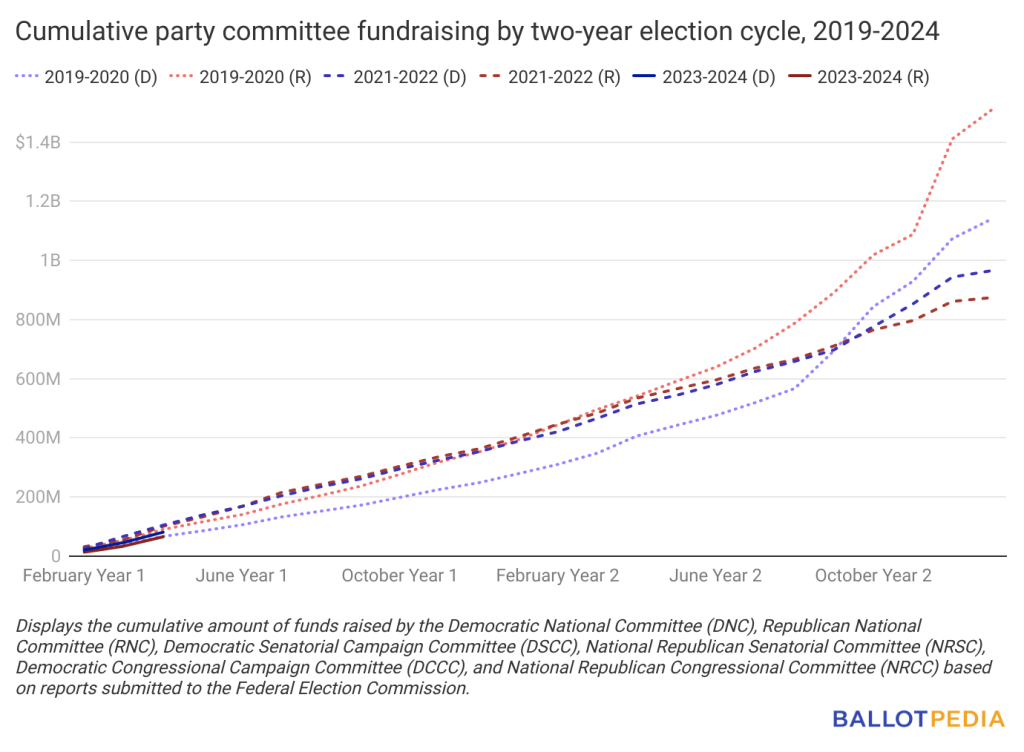
On the Republican side, the three committees raised $66 million as of last month, which is lower than their March 2019 fundraising total ($90 million) and their March 2021 fundraising total ($101 million).
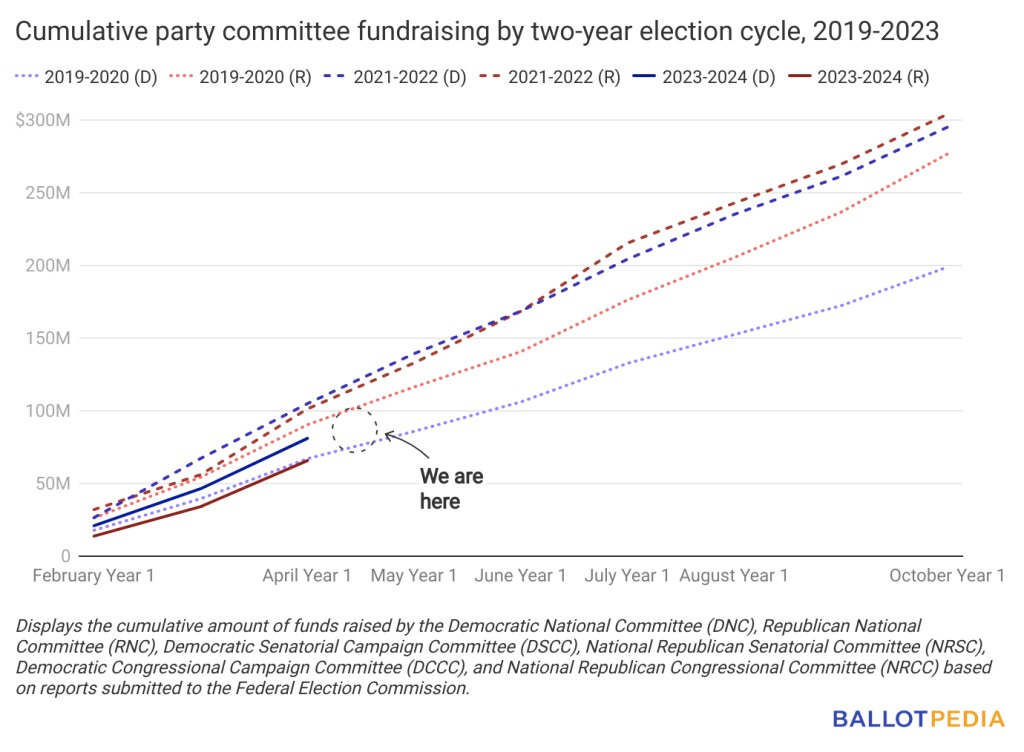
Learn more about party committee fundraising at the link below.


